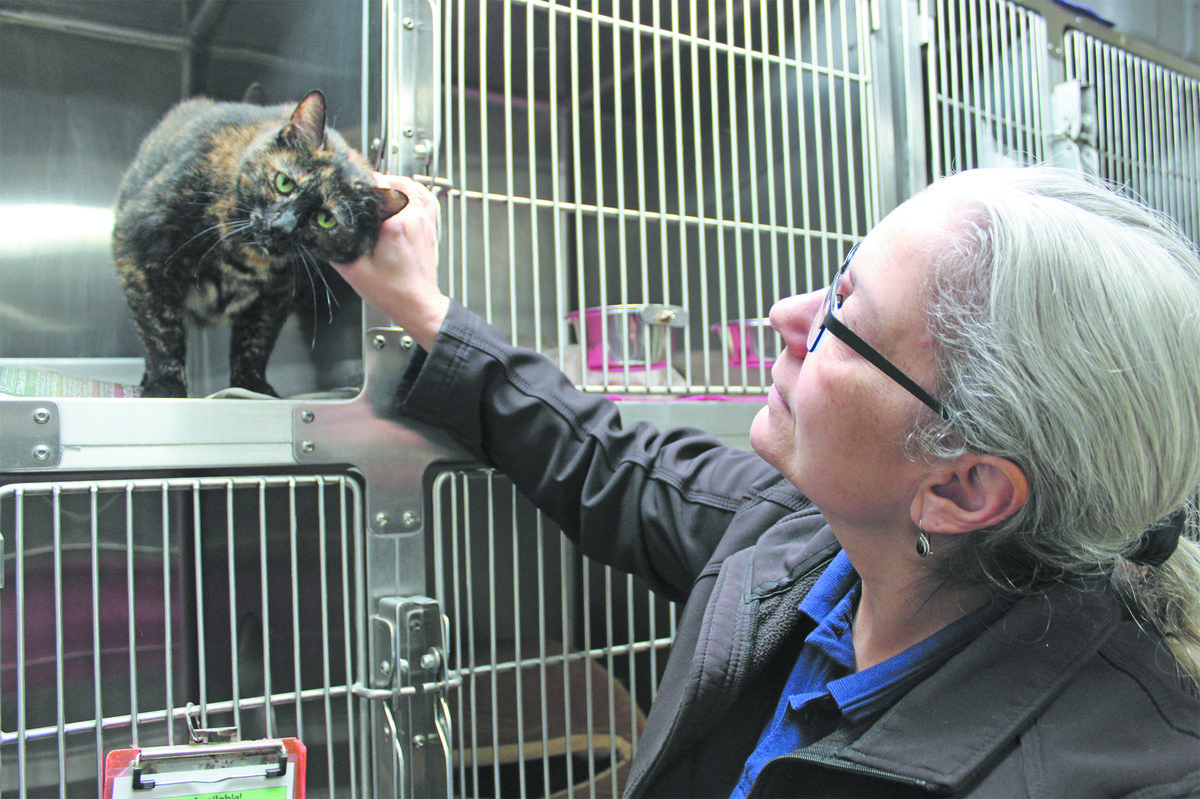
Photo by Melissa Daugherty
Chico Animal Shelter’s Tracy Mohr pets a tortoise shell cat that likely will be put up for adoption soon.
Tamara Yates and her husband, Chris, were beaming on Tuesday morning (Jan. 22) in the office of the Chico Animal Shelter.
They were there to pick up Shadow, a Labrador mix they are taking in through a foster-to-adopt program. Rescued months earlier from fire-charred Concow, the mellow black dog wagged her tail and casually laid down in a sunny spot just inside the entrance.
But to hear Yates tell it, that’s a far cry from the dog she met months ago while volunteering at emergency animal shelters established in the wake of the Camp Fire. Back then, Shadow chewed up blankets and even the medical records hanging from her crate, Yates recalled.
“She was one of the very, very nervous dogs at the beginning,” she said.
Her first contact with Shadow was at the now-closed shelter at the Chico Municipal Airport, but Yates didn’t get to know the dog well until she was moved to another temporary facility in Oroville. What helped calm her was the acupressure Yates is certified to give. Through that treatment, a bond developed.
“She basically picked me,” Yates said.
Shadow is one of several hundred Camp Fire pets that, 2 1/2 months after the deadly wildfire, remain unclaimed and are likely to be adopted by the general public.
According to Lisa Almaguer, Butte County Public Health’s public information officer, approximately 3,000 animals were taken into Butte County Animal Control’s emergency shelters following the disaster. Some were brought by owners or strangers who picked them up during the evacuation. Others came by way of first responders or the North Valley Animal Disaster Group’s animal evacuation teams.
Each has been posted on campirerescuedanimals.com since shortly after the Nov. 8 firestorm, Almaguer said. Still, reunification is proving elusive for many animals, primarily cats.
In mid-December, Shadow and the other pets in temporary shelters were transferred to year-round facilities throughout the region, including the Northwest SPCA, Paradise Animal Shelter, Butte Humane Society and Chico Animal Shelter. (Still others are housed at veterinary clinics.)
Once at those facilities, the animals were to be held for 30 days. After that, beginning last Friday (Jan. 19), they could be legally adopted, Almaguer said.
But that doesn’t mean it’s too late for people to retrieve their beloved pets.
According to Tracy Mohr, animal services manager for the Chico Animal Shelter, the city-run facility is working to reunite owners with the dozens of Camp Fire animals in its care, both unidentified and owned animals. That includes, for example, sending letters to the residences at which the animals were picked up.
“Our goal is always reunification,” she said.
Along those lines, the shelter isn’t charging for the animals’ care.
Mohr emphasized that it’s important for pet owners to communicate with shelter staff, who are willing to be flexible on pick-up dates for those still establishing stable housing. Silence will trigger a letter giving them a date by which to respond. After that, the animals will be screened for health and temperament before being put up for adoption. All of them also must be spayed or neutered.
“Legally, they are ours now, so we’re following our standard protocols,” she said.
As far as adoptions, the shelter will begin with the animals whose owners have surrendered them. Those interested should check out chicoanimalshelter.org. Dogs are shown only by appointment, she noted.
By Tuesday afternoon, Yates said Shadow the Lab mix was settling in nicely at her home in Cohasset. The dog tested positive for heartworm and will have to undergo treatments, but is otherwise healthy.
Yates had recently lost her 19-year-old Jack Russell terrier, so the rescuing goes both ways.
“This dog has just helped,” she said. “We’re healing each other.”
